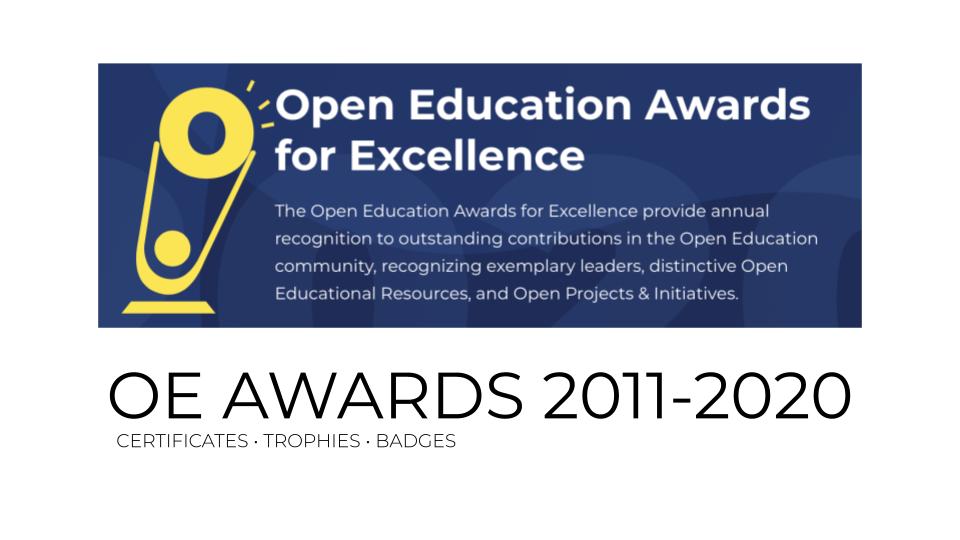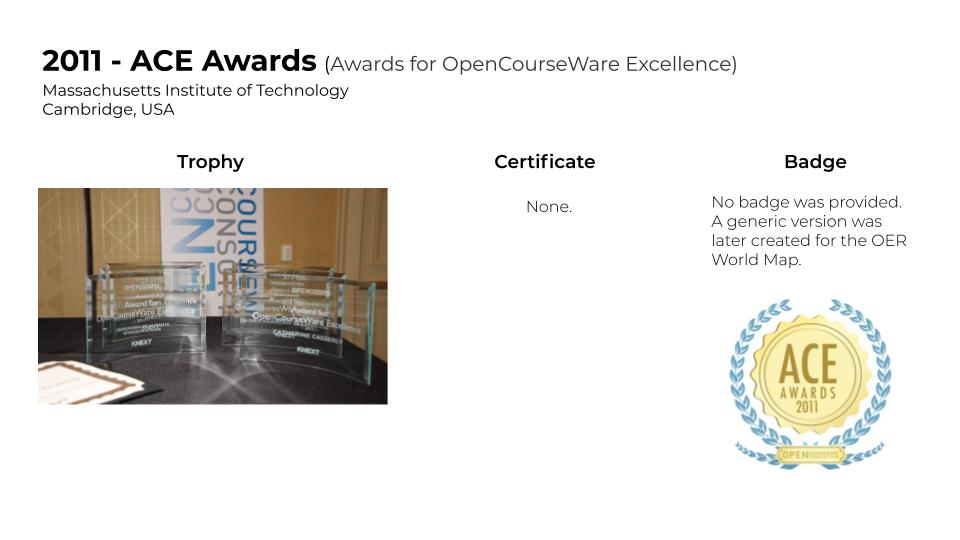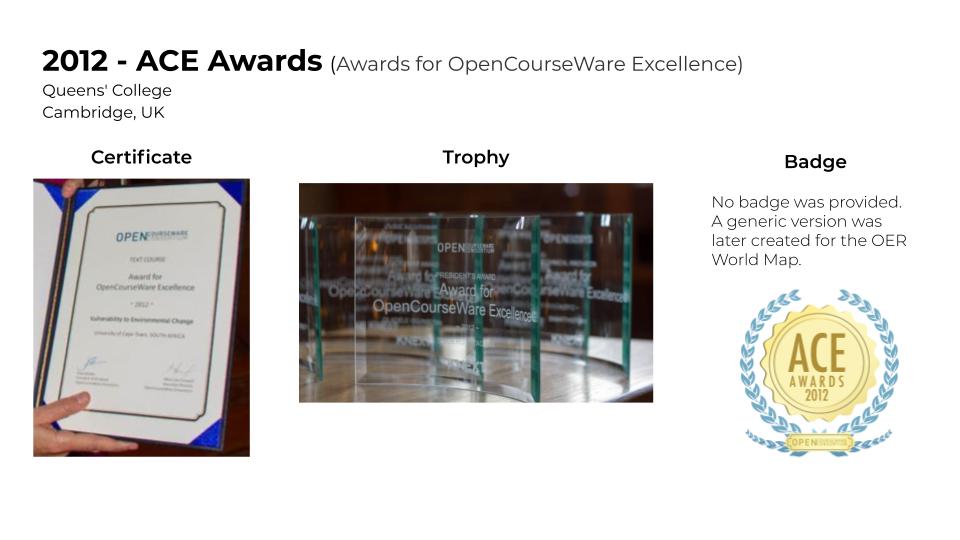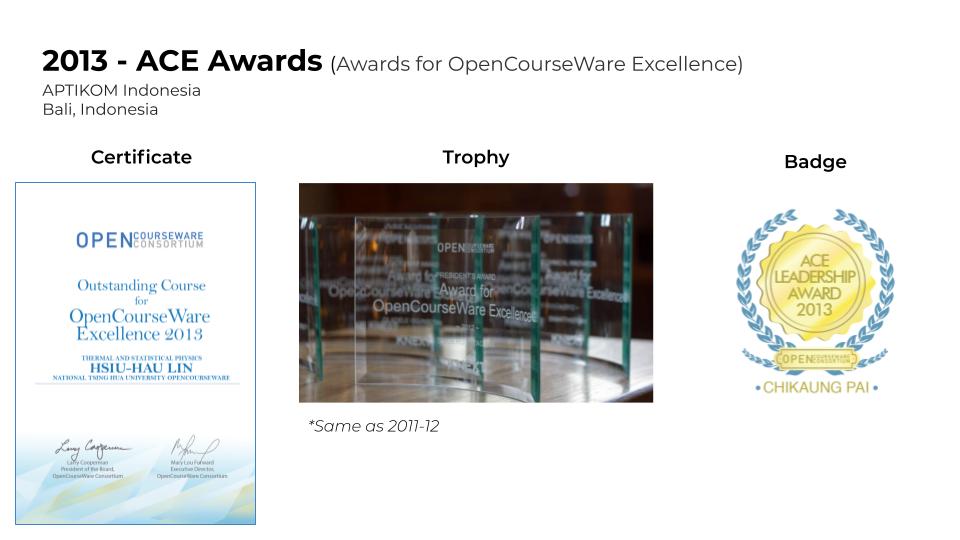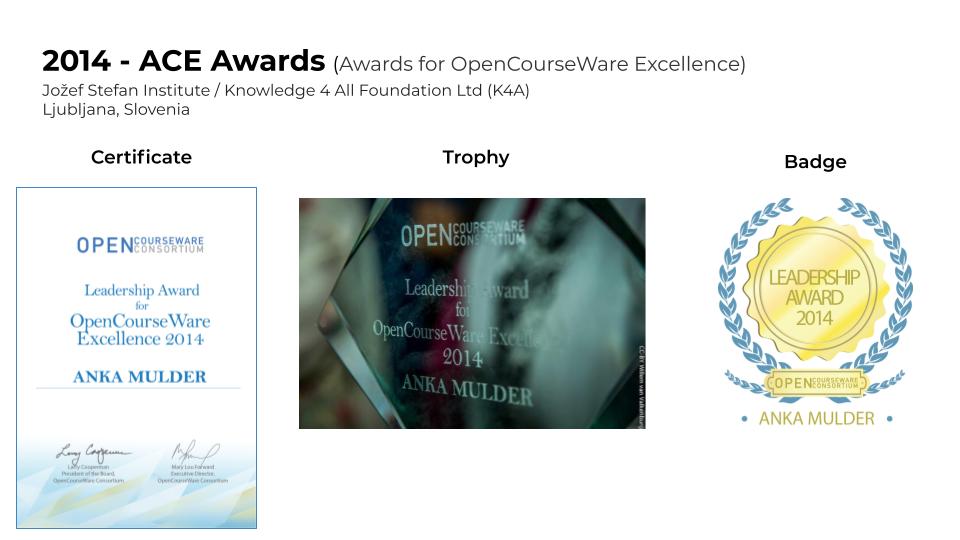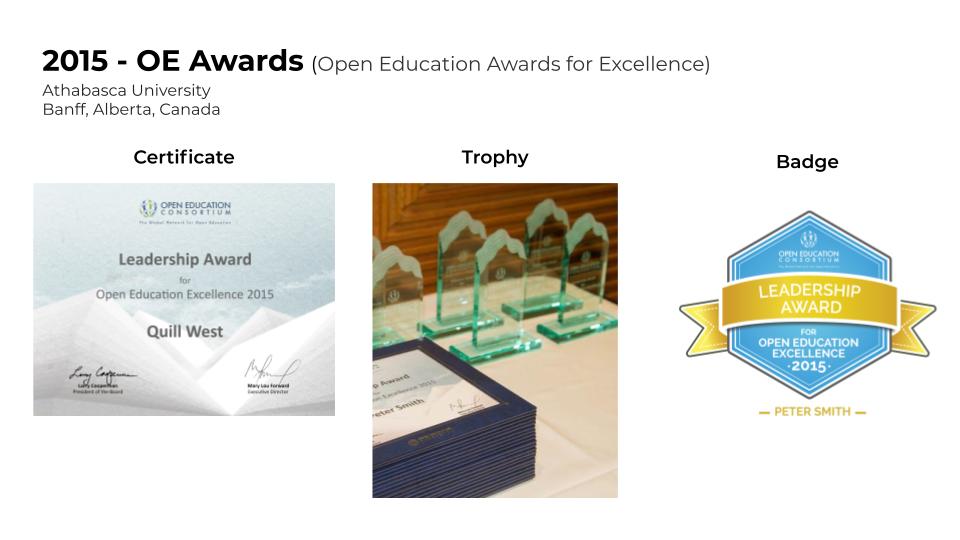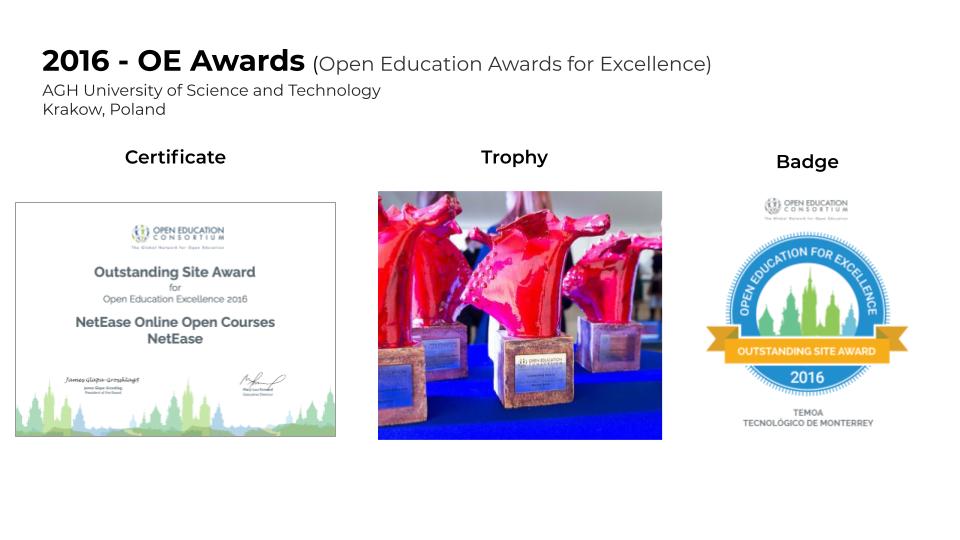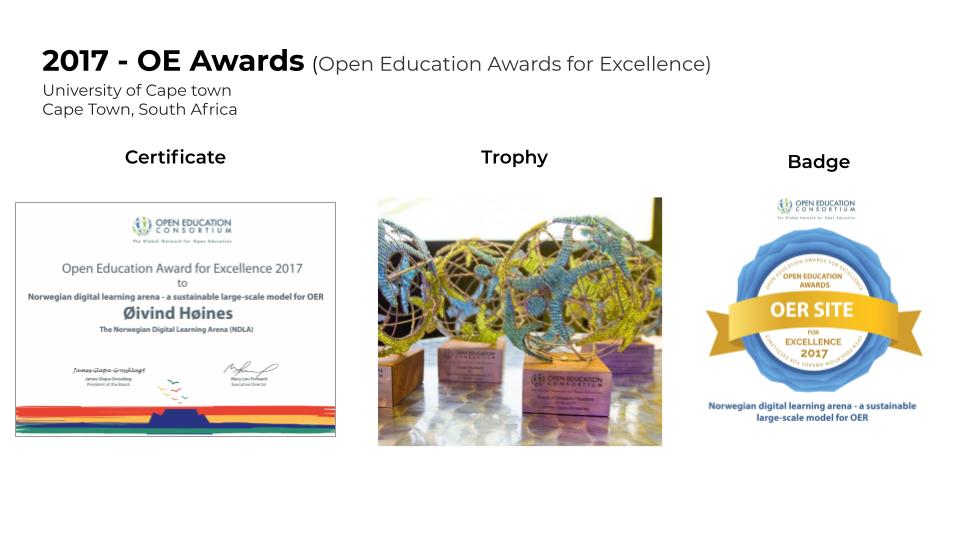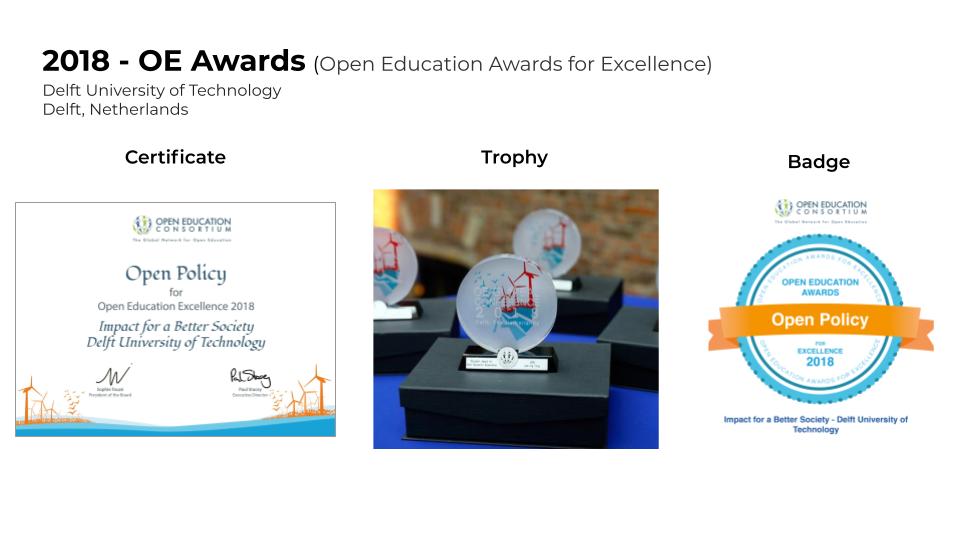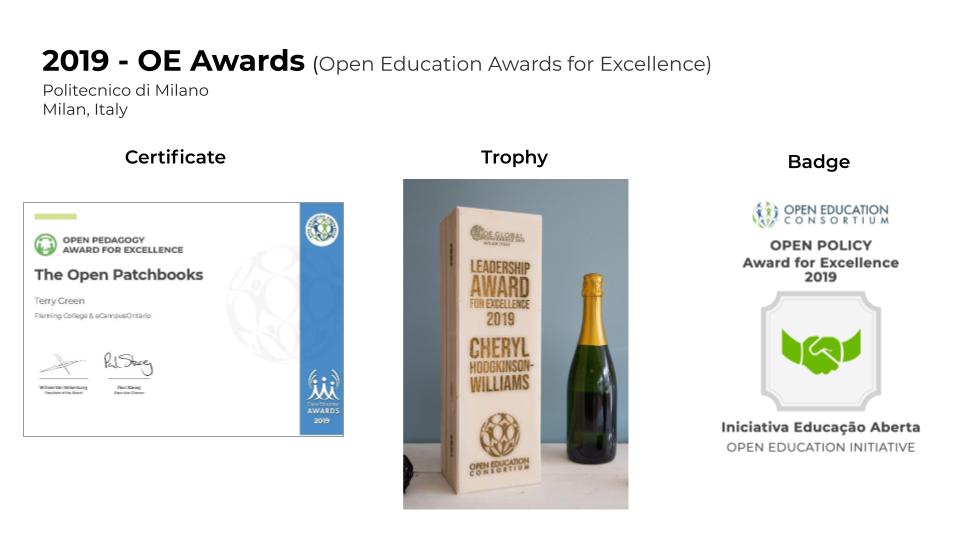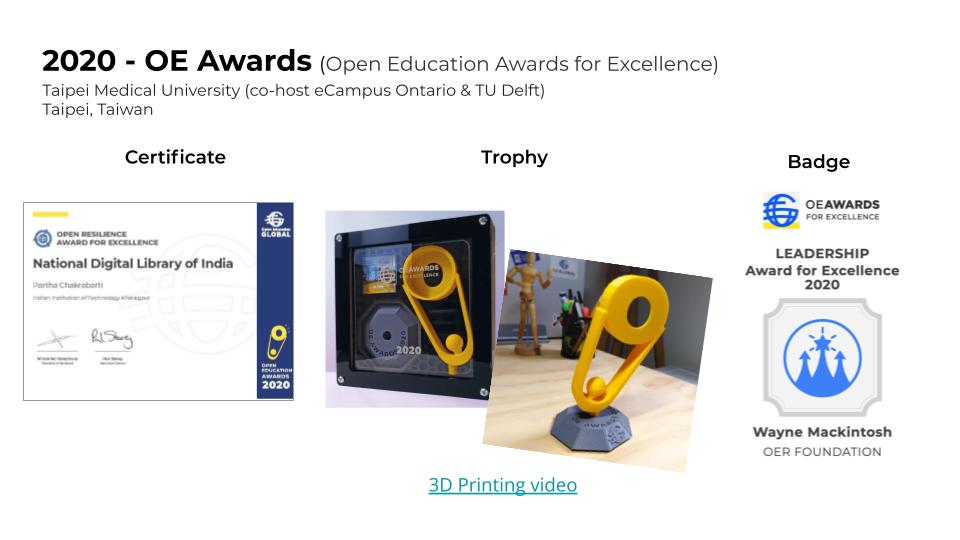History of the Awards
Following MIT’s launch of the OpenCourseWare Consortium in 2005, hundreds of higher education institutions worldwide joined, providing free online access to their own course content, including lecture notes, problem sets, exams, and videos.
These early institutional efforts focused on simply posting online the teaching and learning materials associated with the campus-based course. Materials were not instructionally designed for online learning delivery. What made them “open” was the free online availability to view the materials and their availability for use and adaptation under an open license, such as certain Creative Commons licenses.
OpenCourseWare did not typically include support for student enrollment, certification, or access to faculty; it was primarily a means of publishing the course online for anyone to view, learn from, and repurpose.
OpenCourseWare was appealing because it aimed to enhance human learning worldwide by making knowledge contained in these courses available on the web. On-campus students used OpenCourseWare to preview and select courses to take and to review what took place in class.
2011 – Inaugural Awards –
Individual, Site, and Courseware
In 2011 the OpenCourseWare Consortium launched the Awards for OpenCourseware Excellence (ACE). The awards aimed to provide annual recognition to outstanding individuals and initiatives that moved the ideals of OpenCourseWare and Open Educational Resources forward.
Three award categories in 2011 recognized Individuals, Sites, and Courseware. Individual awards included the Leadership ACE for significant leadership in the OCW/OER community and the Educator ACE for educators who published a significant body of courseware. Site awards highlighted New Sites, Landmark Sites launched before 2012, and Technical Innovation. Courseware awards recognized excellence in both courses featuring video/multimedia and text/illustration.
Right from the start, the awards recognized the importance of celebrating and thanking open education practitioners for their outstanding work while at the same time raising awareness and visibility of exemplary open education initiatives to inspire others.
The inaugural 2011 year established a set of precedents for the awards that have persisted over time including: nominations from the community, an awards committee of open community peers, individual awards selected by Consortium Board of Directors, and announcing the awards at the annual conference. The award format established in 2011 was used for the next two years.
2014 – MOOCs and Project Awards
In 2014, three Site Awards were consolidated into a single award category Outstanding Site. Similarly, the two CourseWare Awards were made into an award simply called Outstanding Course.
A new individual award for Lifetime Achievement was added to recognize an individual who had greatly contributed to the advancement of open education throughout their career. This special award complemented the 2011 President’s Award, another special category award given to an individual whose exceptional contributions to the field of open education serve as an inspirational model of engagement and commitment. These special awards given by the OpenCourseWare Board of Directors are not awarded every year.
2014 also saw a new award category called Open MOOC (Massive Open Online Course). MOOCs differ from OpenCourseWare because they focus on conducting and delivering a course open for anyone to enroll in for free. As a result, some MOOC courses have tens and even hundreds of thousands of participants.
Early MOOCs, called cMOOC or Connectivist MOOCs, emphasized open-access features, such as open licensing of content to promote the reuse and remixing of resources, and learning out on the open web rather than being confined to a closed online learning platform. Later MOOCs, sometimes called xMOOCs, used closed licenses for their course materials while maintaining free access for students. By 2014, MOOCs had become an enormous phenomenon and several prominent universities had launched MOOC platforms. MIT launched edX. Stanford created Coursera. The Open University of UK developed FutureLearn. Many OpenCourseWare Consortium members used these platforms to diversify their open education efforts to include MOOCs.
The Open MOOC award recognizes excellence in an openly licensed MOOC of exemplary quality in breadth, depth, and creative presentation of educational content.
2014 also saw the introduction of Projects Awards. This new category recognized efforts that support the production, use, and/or promotion of OCW/OER in ways other than the creation and use of material resources.
Three types of Project Awards were created. Creative Innovation Awards recognized new approaches, ideas, or solutions that improve the discoverability, presentation, usability, accessibility or availability of course materials. Engagement Awards recognize excellence in student/user retention. The Open Research Award recognized excellence in research studies about open education and/or related areas.
These Project Awards show the field of open education evolving. There was a growing recognition that ensuring awareness, effectiveness and impact was as important as creating content. With the growth in open education materials, discoverability and usability became increasingly relevant. The field realized the importance of research and measurements of use and impact to substantiate the benefits of open education.
2017 – Open Educational Resources
In 2017 a new category of awards was added called Open Educational Resources (OER). OER are teaching, learning, and research materials in any medium – digital or otherwise – that reside in the public domain or have been released under an open license that permits no-cost access, use, adaptation, and redistribution by others with no, or limited, restrictions.
OER come with 5R permissions, including the permission to:
- Retain – the right to create, own, and control copies of the content;
- Reuse – the right to use the content in a wide range of ways;
- Revise – the right to adapt, adjust, modify, or alter the content itself;
- Remix – the right to combine the original or revised content with other material to create something new;
- Redistribute – the right to share copies of the original content, the revisions, or the remixes with others.
OER can include textbooks, instructional materials, interactive simulations, lesson plans, full courses, and even complete degrees (often called Z-Degrees). OER provide academic freedom to customize, localize, translate, and update as required. OER expand and enhance the academic offering of an institution. OER are typically stored and distributed through websites, platforms, or repositories that provide search, view, and download capabilities.
The OER award category recognizes resources beyond courses and sites, acknowledging the wide variety of innovative OER being developed around the world. This new category includes awards for best OER Site, OER Collection, Open Tool, Open Textbook, Open Faculty Development Program, and OER Library/Network. These awards show how the open education movement diversified from courses and MOOCs to include a wide range of teaching and learning resources.
Open textbooks became a huge development in the open education movement. They are funded, published, and licensed to be freely used, adapted, and distributed. Users can download open textbooks for no cost, or print them at low cost. Compared to expensive proprietary textbooks, open textbooks save students and governments hundreds of millions of dollars.
The Open Faculty Development Program award was suggested by the community. Its creation reflected the growing awareness that open education involves a different set of practices for educators. It highlights the importance of acquiring the skills to successfully do open education.
Especially striking is the inclusion of an award for libraries and librarians who increasingly became key contributors to open education efforts through their skillful ability to find existing OER for reuse and for their ability to create and curate collections of OER pertinent to the local needs of an educator, institution, or school.
By 2017, the awards reflected the significant growth of open education and the expanding range of stakeholders.
2018 – Students, Open Source Software, Open Pedagogy, Open Data, Open Policy, Open Culture, Open Science
A Student Award was added in 2018 to recognize the outstanding endeavors of a student who has benefited academically from the use of OER and whose achievements inspire others to pursue degree programs utilizing open resources.
Over time the criteria for the Open Education Award for Excellence Student Criteria evolved to include students who had used or created OER over a sustained period, demonstrated innovative ways of incorporating OER in their studies, and influenced peers to share materials more openly through open practices.
The OER & Projects Awards category broadened to include Open Tools and Open Practices to encourage nominations related to other areas of openness. Doing so fosters relationships among the variety of innovative open initiatives around the world.
The OER Site, Collection, and Library Awards were consolidated into an award for best OER Repository. New awards were added for Free and Open Source Software (FOSS) for Education, Open Data, Open Access, Open Pedagogy, Open Policy, Open Culture and Open Science. Here again, we see evidenced in the awards the widening impact of openness on education.
The new 2018 awards depict the evolution and emerging importance of certain elements of open education. By this time, “open” was affecting all aspects of education, teaching and learning, research, and community public service. The expansion of the awards mirrors this growing diversity of impact.
Particularly notable is the inclusion of an award not just for Leadership and Educators but also for Students. Over the years, student awareness of open education has grown. Many students have taken on advocacy roles presenting compelling evidence to faculty and institutional leaders in favor of open education. Additionally, open education engages students as co-creators of knowledge, making the learning experience more meaningful and engaging.
Free and Open Source Software has long been an essential element of the high technology world. In the open education context, this award recognizes FOSS applications proven to be essential tools for professionals, trainers, and teachers for building, and delivering OER.
Open Data in education is associated with open access research articles where the research data sets are openly published to ensure research is verifiable and replicable. Open data and open data practices are increasingly used in teaching and learning, especially in science domains. A new emerging focus for open data in education is student data collected by education technologies and institutions. Privacy and ethics concerns with the use of open data is of growing importance in the field. The Open Data Award for Excellence was for projects demonstrating best practices in making data openly available, accessible, and reusable for the public.
Open Access (OA) refers to research published in a way that is digital, online, free of charge, and free of most copyright and licensing restrictions. OA removes price barriers such as subscriptions and pay-per-view fees giving researchers, students, and the public access to research. OA ensures the public has access to the results of publicly funded research.
OA makes research discoverable, available, and reproducible for the advancement of science. When used for teaching and learning OA articles are a form of OER. The Open Access Award for Excellence is for online research outputs that are dynamic, openly accessible, and free of all restrictions for use and reuse. This category also includes initiatives that actively advance the Open Access agenda.
Open education is functionally different than traditional forms of education. It involves new norms and cultural practices, including sharing, collaborative authoring, finding and reusing existing resources, modifying and customizing educational materials through translation, and adaptation to local contexts. One of the most exciting new practices is open pedagogy. This practice engages learners in activities and assignments that generate public knowledge benefiting themselves and the larger public. The Open Pedagogy Award is for an innovative open teaching practice that incorporates openness in several levels of the learning process. This award emphasizes student involvement in creating, adapting, or updating OER and improving and promoting more effective teaching of open practices.
These new open practices are a form of system change requiring policy changes at the government, institution, and school level. The Open Policy Award recognizes creation, adoption, and implementation of an open policy, legislation, or mandate. The award targets open policies that show a clear impact of public investment in the development of open knowledge through the efficient use and reuse of resources for the public good.
Open Culture refers to the use of open licenses and practices by Galleries, Libraries, Archives, and Museums (known as the GLAM sector). Open culture organizations provide a vast array of educational materials. The Open Culture Award recognizes an exemplary initiative promoting free and open access to cultural heritage collections. The award is for projects that showcase and make available historical objects, art collections, books and other cultural artifacts freely, openly, and without any restrictions.
Open science is the movement to make scientific research and data accessible to all levels of an inquiring society. As a practice, open science allows others to collaborate and contribute by making research data, lab notes, and other research processes freely available under terms that enable reuse, redistribution, and reproduction of the research and its underlying data and methods. In the context of open education, open science frequently involves the use of OER, OA, and open data and engaging the public in citizen science. The Open Science Award For Excellence recognizes an open science initiative using practices that allow others to collaborate and contribute.
The 2018 Awards strikingly demonstrate how far open education has evolved from the early OpenCourseWare days.
2019 – Open Collaboration & OER Curation
The 2019 awards added two new awards. One for Open Collaboration and another for OER Curation / Librarianship.
Open education development and practices are a team effort. The Open Collaboration award is for a thriving environment that fosters the collective production of open resources and open practices with a shared goal. These collaborations are an interchange of ideas supported through technologically mediated collaborative platforms. They develop new opportunities for people to form ties with others and create things together; encouraging diversity of goals, backgrounds, and cultures. These might include communities of practice, joint project ventures, multi-institutional collaboration, and multinational cooperation.
Librarians are essential members of open education teams. The OER Curation / Librarianship award recognizes librarians’ efforts in creating exceptional collections of high-quality OER presented after a curation process. Strong curation involves carefully selecting content and evaluating it for a particular purpose and presenting it in a meaningful and organized way that can be customized and re-shared for future users.
2020 – Open Resilience, Open Support Specialist, Emerging Leader, UNESCO OER Recommendation Implementation
The arrival of the COVID pandemic in 2020 disrupted education around the world. In response, the 2020 awards included an Open Resilience award that recognizes exemplary leadership (individual or organizational) and Open Education practices implemented in the context of COVID-19. Open Resilience activities demonstrate the implementation of open education practices to address opportunities and challenges arising from COVID-19.
The Support Specialist Award is for an individual actively engaged in using and promoting OER and Open Practices. The award is for a person, other than a professor/teacher, that supports the ideals of the Open Education movement through their own practices. Support specialists include librarians, researchers, instructional designers, policymakers, and administrators.
The Emerging Leader Award is granted to an enthusiastic individual displaying promising leadership qualities. This person’s advocacy and use of open education is inspiring, demonstrated a strong commitment towards Open Education, or has achieved significant accomplishments, making them an effective spokesperson.
In November of 2019 all 193 members of UNESCO unanimously adopted the UNESCO OER Recommendation. The UNESCO OER Recommendation Implementation award recognizes exemplary leadership (individual or organizational) and practices to support the implementation of the UNESCO OER Recommendation.
Into The Future
The Open Education Awards for Excellence have served as a means of celebration, gratitude, and inspiration for ten years. Looking into the future, Open Education Global plans to sustain and further amplify them. The awards now have their own dedicated website https://awards.oeglobal.org/ providing a historical archive of awards over time. The site will host the nomination and selection process each year and feature profiles of award winners. The website also includes an OEG Voices podcast series that features interviews with award winners.
The extraordinary Marcela Morales has led the awards for their entire ten years. Marcela ensures the categories are current, relevant, and reflect the emerging innovations in the Open Education movement. She also guides the nomination and selection process, including organizing certificates, trophies, and events to celebrate the outcome. Marcela exemplifies the world of openness where knowledge is openly and freely accessible. Special thanks to her for being such a faithful steward.
Open Education also thanks all those who have been part of the process, including nominators, evaluators, and awardees. We look forward to many more years of Open Education Awards for Excellence.
